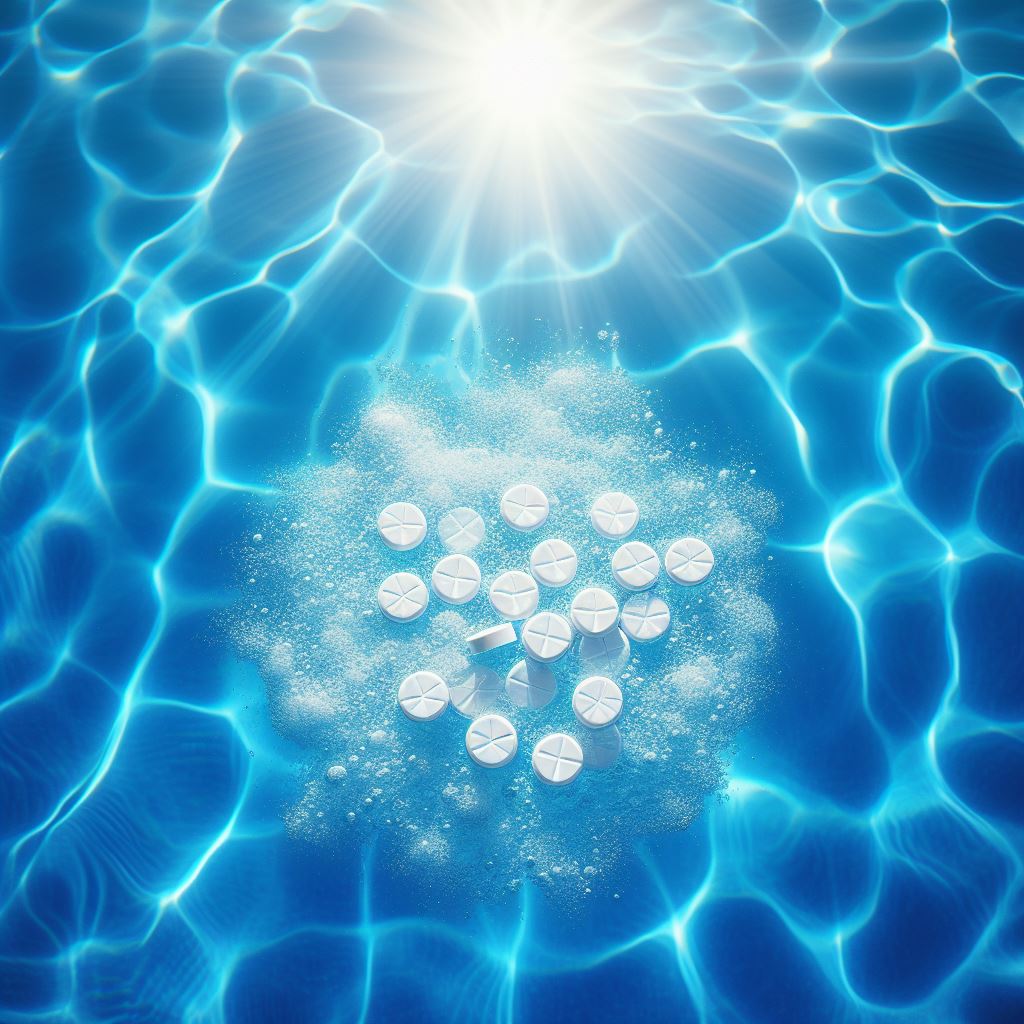Maintaining appropriate levels of total chlorine residual in swimming pools is essential for effective disinfection and ensuring a safe and healthy swimming environment. Pool chlorine tablets are commonly used to provide a steady and controlled release of chlorine, but managing total chlorine residual levels requires careful attention to dosage, monitoring, and maintenance practices. This article delves into the importance of controlling total chlorine residual after disinfection with pool chlorine tablets, factors influencing residual levels, monitoring techniques, and strategies for maintaining optimal water quality.

Understanding Total Chlorine Residual
Total chlorine residual refers to the combined concentration of free chlorine and combined chlorine in the pool water. Free chlorine is the active form of chlorine that effectively sanitizes the water by killing bacteria, algae, and other contaminants. Combined chlorine, also known as chloramines, is formed when free chlorine reacts with organic compounds, such as sweat, urine, and oils, and is less effective at disinfection.
Importance of Controlling Total Chlorine Residual
Effective Disinfection: Maintaining appropriate total chlorine residual levels ensures effective disinfection of pool water, reducing the risk of waterborne illnesses and infections among swimmers.
Preventing Chlorine Odor and Irritation: Elevated levels of combined chlorine can result in unpleasant chlorine odors and cause eye and skin irritation in swimmers. Controlling total chlorine residual helps minimize the formation of chloramines and maintains a comfortable swimming environment.
Water Clarity: Properly balanced total chlorine residual levels contribute to clear, sparkling pool water by effectively eliminating organic contaminants and preventing algae growth.
Factors Influencing Total Chlorine Residual Levels
Chlorine Dosage
The dosage of pool chlorine tablets added to the water directly influences total chlorine residual levels. Over-dosing can lead to excessive total chlorine levels, while under-dosing may result in inadequate disinfection.
Organic Contaminants
The presence of organic contaminants, such as sweat, urine, and sunscreen, in the pool water can contribute to the formation of combined chlorine and influence total chlorine residual levels.
pH Levels
The pH level of the pool water affects the distribution of free chlorine and combined chlorine. Maintaining the pH within the recommended range (typically 7.2 to 7.6) helps optimize the effectiveness of chlorine disinfection and control total chlorine residual levels.
Sunlight Exposure
Exposure to sunlight can accelerate the breakdown of free chlorine, reducing total chlorine residual levels. Stabilizers, such as cyanuric acid, can help protect chlorine from degradation and maintain stable residual levels in outdoor pools.
Controlling Total Chlorine Residual
Regular Monitoring: Monitor total chlorine residual levels regularly using a reliable pool water testing kit. Test the water at least once or twice a week, or more frequently during periods of heavy pool usage or hot weather.
Adjusting Chlorine Dosage: Based on the test results, adjust the dosage of pool chlorine tablets as needed to maintain total chlorine residual levels within the recommended range (typically 1.0 to 3.0 ppm).
Shock Treatment: Periodic shock treatments with a non-chlorine shock or oxidizing agent can help eliminate chloramines and restore total chlorine residual levels. Follow manufacturer instructions and safety precautions when performing shock treatments.
pH Adjustment: Monitor and adjust the pH level of the pool water to maintain optimal chlorine disinfection and total chlorine residual levels. Use pH increaser or pH decreaser as needed to keep the pH within the recommended range.
Proper Filtration: Ensure the pool filtration system is operating efficiently to remove organic contaminants and maintain water clarity. Clean and backwash the filter regularly to prevent clogging and ensure optimal filtration performance.
Conclusion
Controlling total chlorine residual levels after disinfection with pool chlorine tablets is essential for effective sanitation, preventing chlorine odors and irritation, and maintaining water clarity in swimming pools. By understanding the factors influencing total chlorine residual levels and implementing monitoring, dosage adjustment, shock treatment, pH adjustment, and proper filtration practices, pool owners can ensure a safe, comfortable, and enjoyable swimming environment for all users. Regular testing, maintenance, and adjustments are key to achieving and maintaining optimal total chlorine residual levels in swimming pools.

 Instant
Quote
Instant
Quote Email
Us
Email
Us